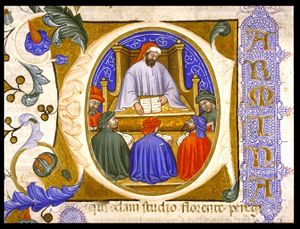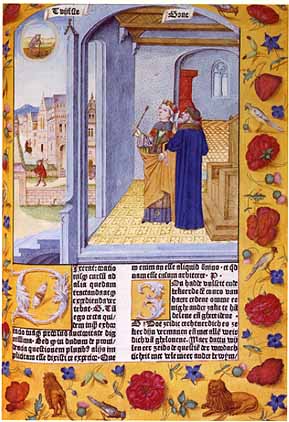Severini Boesyo
Severini Boesyo (jina kamili kwa Kilatini: Anicius Manlius Severinus Boëthius[1][2][3] Roma, 480 – Pavia, 524 BK), alikuwa seneta wa Bunge la Roma, gavana, magister officiorum, na mwanafalsafa wa mwanzo wa karne ya 6.

(mchoro mdogo wa mwaka 1385 katika nakala ya Consolation of Philosophy.)

Maarufu kwa elimu na kwa maandishi yake, alimtumikia Mungu kwa uaminifu hadi kifodini chake [4].
Maisha
haririAliishi na kufanya kazi chini ya utawala wa Waostrogoti walioteka Italia na kumaliza Dola la Roma miaka 4 kabla hajazaliwa.
Hatimaye mfalme Theodoriki Mkuu aliagiza auawe mwaka 524 kwa tuhuma ya kufanya njama ya kumuua.[5]
Akiwa gerezani, Boesyo aliandika kitabu chake bora, De Consolatione Philosophiae ("Faraja ya Falsafa"), ambacho ni kati ya vile vilivyoathiri zaidi Karne za Kati[6] .
Heshima baada ya kifo
haririTangu mwaka 1883 Kanisa Katoliki linamheshimu Boesyo kama mtakatifu mfiadini.[7]
Papa Benedikto XVI alifafanua umuhimu wa Boesyo kwa Wakristo wa leo kwa kuhusianisha mafundisho yake na uelewa wa Maongozi ya Mungu. [8]
Maandishi
hariri- Hisabati
- De arithmetica (On Arithmetic, c. 500) adapted translation of the Introductionis Arithmeticae by Nicomachus of Gerasa (c. 160 – c. 220).
- De musica (On Music, c. 510), based on a lost work by Nicomachus of Gerasa and on Ptolemy’s Harmonica.
- Possibly a treatise on geometry, extant only in fragments.[10]
- Mantiki
- A) Tafsiri
- Porphyry’s Isagoge
- In Categorias Aristotelis: Aristotle's Categories
- De interpretatione vel periermenias: Aristotle's De Interpretatione
- Interpretatio priorum Analyticorum (two versions): Aristotle's Prior Analytics
- Interpretatio Topicorum Aristotelis: Aristotle's Topics
- Interpretatio Elenchorum Sophisticorum Aristotelis: Aristotle's Sophistical Refutations
- B) Ufafanuzi
- In Isagogen Porphyrii commenta (two commentaries, the first based on a translation by Marius Victorinus, (c. 504-5059); the second based on Boethius’ own translation (507-509).
- In Categorias Aristotelis (c. 509-511)
- In librum Aristotelis de interpretatione Commentaria minora (not before 513)
- In librum Aristotelis de interpretatione Commentaria majora (c. 515–16)
- In Aristotelis Analytica Priora (c. 520–23)
- Commentaria in Topica Ciceronis (incomplete: the end the sixth book and the seventh are missing)
- Vitabu vya pekee
- De divisione (515–520?)
- De syllogismo cathegorico (505–506)
- Introductio ad syllogismos cathegoricos (c. 523)
- De hypotheticis syllogismis (516-522)
- De topicis differentiis (c. 522–23)
- Opuscola Sacra (Theological Treatises)
- De Trinitate (c. 520–21)
- Utrum Pater et Filius et Spiritus Sanctus de divinitate substantialiter praedicentur (Whether Father and Son and Holy Spirit are Substantially Predicated of the Divinity)
- Quomodo substantiae in eo quod sint bonae sint cum non sint substantialia bona [also known as De hebdomadibus] (How Substances are Good in that they Exist, when They are not Substantially Good)
- De fide Catholica
- Contra Eutychen et Nestorium (Against Eutyches and Nestorius)
- De consolatione Philosophiae (524–525).
Tazama pia
haririTanbihi
hariri- ↑ The name Anicius demonstrated his connection with a noble family of the Lower Empire, while Manlius claims lineage from the Manlii Torquati of the Republic. The name Severinus was given to him in honour of Severinus of Noricum.
- ↑ Hodgkin, Thomas. Italy and Her Invaders. London: Adamant Media Corporation, 2001.
- ↑ "Boethius" has four syllables in English, Kigezo:IPAc-en, the o and e are pronounced separately. It is hence traditionally written with a diæresis, viz. "Boëthius", a spelling which has been disappearing due to the limitations of typewriters.
- ↑ https://www.santiebeati.it/dettaglio/90400
- ↑ The Online Library of Liberty, Boethius. Internet. Available from http://oll.libertyfund.org/index.phpoption=com_content&task=view&id=215&Itemid=269; accessed November 3, 2009.
- ↑ Benedictine Monks of St. Augustine's Abbey, The Book of Saints, 6th ed., 1989, p. 507
- ↑ He was declared a saint by the Sacred Congregation of Rites in 1883
- ↑ http://www.vatican.va/holy_father/benedict_xvi/audiences/2008/documents/hf_ben-xvi_aud_20080312_en.html General Audience of Pope Benedict XVI, 12 March 2008
- ↑ Roman Martyrology
- ↑ Folkerts, Menso, mhr. (1970). Boethius’ Geometrie II. Ein mathematisches Lehrbuch des Mittelalters. Wiesbaden: Franz Steiner.
Marejeo
hariri- Attwater, Donald; Catherine Rachel John (1995). The Penguin Dictionary of Saints. London: Penguin Books. ISBN 0-14-051312-4. OCLC 34361179.
- Baird, Forrest E.; Walter Kaufmann (2008). From Plato to Derrida. Upper Saddle River, New Jersey: Pearson Prentice Hall. ISBN 0-13-158591-6.
- Chadwick, Henry (1981). Boethius, the Consolations of Music, Logic, Theology, and Philosophy. Oxford: Clarendon Press. ISBN 0-19-826549-2. OCLC 8533668.
- Colish, Marcia L. (2002). Medieval Foundations of the Western Intellectual Tradition, 400-1400. New Haven: Yale University Press. ISBN 0-300-07852-8. OCLC 185694056.
- Magee, John (1989). Boethius on Signification and Mind. Leiden: Brill. ISBN 9-0040-9096-7.
- Marenbon, John (2004). Boethius. Oxford: Oxford University Press. ISBN 0-19-513407-9. OCLC 186379876.
- Marenbon, John (2009). The Cambridge Companion to Boethius. Cambridge: Cambridge University Press. ISBN 0-52-187266-9.
- Suto, Taki (2011). Boethius on Mind, Grammar and Logic. A Study of Boethius' Commentaries on Peri Hermeneias. Cambridge: Brill. ISBN 978-9004214187.
- Westfall, Joseph (2008). "Boethius: Kierkegaard and The Consolation". Katika Stewart, Jon (mhr.). Kierkegaard and the Patristic and Medieval Traditions. Ashgate. ku. 207–222. ISBN 9780754663911.
Marejeo mengine
hariri- Boethius, Anicius Manlius Severinus (1926), trans., H. F. Stewart, E. K. Rand, and "I. T.". The Theological Tractates and The Consolation of Philosophy. Cambridge, MA: Harvard, Loeb Classical Library, parallel text.
- Papahagi, Adrian (2010). Boethiana Mediaevalia – A Collection of Studies on the Early Medieval Fortune of Boethius’ Consolation of Philosophy Ilihifadhiwa 9 Julai 2011 kwenye Wayback Machine.. Bucharest: Zeta Books. ISBN 978-973-199-779-7.
Viungo vya nje
haririMaandishi
hariri| Kigezo:ISO 639 name la Wikisource has original text related to this article: |
- Works by Boethius katika Project Gutenberg
- {en} De Trinitate (On the Holy Trinity) — Boethius, Erik Kenyon (trans.)
- {en} Theological Tractates; Christian Classics Ethereal Library
- A 10th-century manuscript of Institutio Arithmetica is available online from Lund University, Sweden Ilihifadhiwa 5 Septemba 2002 kwenye Wayback Machine.
- The Geoffrey Freudlin 1885 edition of the Arithmetica, from the Cornell Library Historical Mathematics Monographs
- Online Galleries, History of Science Collections, University of Oklahoma Libraries Ilihifadhiwa 13 Novemba 2020 kwenye Wayback Machine. High resolution images of works by Boethius in .jpg and .tiff format.
- Codices Boethiani: A Conspectus of Manuscripts of the Work of Boethius Ilihifadhiwa 29 Machi 2016 kwenye Wayback Machine.
- James, H. R. (translator) [1897] (2007), The Consolation of Philosophy of Boethius, The University of Adelaide: eBooks @ Adelaide, ilihifadhiwa kwenye nyaraka kutoka chanzo mnamo 2007-04-27, iliwekwa mnamo 2016-09-18
{{citation}}:|given1=has generic name (help); Unknown parameter|dead-url=ignored (|url-status=suggested) (help)CS1 maint: numeric names: authors list (link). - Boethius, Anicius Manlius Severinus (1867). "De institutione arithmetica libri duo". Katika Gottfried Friedlein (mhr.). Anicii Manlii Torquati Severini Boetii De institutione arithmetica libri duo: De institutione musica libri quinque. Accedit geometria quae fertur Boetii (kwa Latin). in aedibus B.G. Teubneri. ku. 1–173. Iliwekwa mnamo 2008-08-03.
{{cite book}}: External link in|chapterurl=|chapterurl=ignored (|chapter-url=suggested) (help)CS1 maint: unrecognized language (link) - Boethius, Anicius Manlius Severinus (1867). "De institutione musica libri quinque". Katika Gottfried Friedlein (mhr.). Anicii Manlii Torquati Severini Boetii De institutione arithmetica libri duo: De institutione musica libri quinque. Accedit geometria quae fertur Boetii (kwa Latin). in aedibus B.G. Teubneri. ku. 177–371. Iliwekwa mnamo 2015-10-08.
{{cite book}}: External link in|chapterurl=|chapterurl=ignored (|chapter-url=suggested) (help)CS1 maint: unrecognized language (link)
Maisha na umuhimu
hariri- Blessed Severinus Boethius Ilihifadhiwa 20 Aprili 2008 kwenye Wayback Machine. at Patron Saints Index
- Blackwood, Stephen.The Meters of Boethius: Rhythmic Therapy in the Consolation of Philosophy. Ilihifadhiwa 3 Agosti 2010 kwenye Wayback Machine.
- Blackwood, Stephen (2015). The Consolation of Boethius as Poetic Liturgy. Oxford Early Christian Studies. Oxford University Press. uk. 398. ISBN 9780198718314.
{{cite book}}: External link in|series= - O'Connor, John J.; Robertson, Edmund F., "Severini Boesyo", MacTutor History of Mathematics archive, University of St Andrews.
- Phillips, Philip Edward. Boethius: A Selected Bibliography for Students
- Boethius Ilihifadhiwa 16 Aprili 2007 kwenye Wayback Machine. at The Online Library of Liberty
- On Boethius and Cassiodorus — Papa Benedikto XVI
Mantiki na falsafa yake
hariri- The Philosophical Works of Boethius. Editions and Translations
- Boethius' Logic and Metaphysics. An Annotated Bibliography
| Makala hii bado ni mbegu. Je, unajua kitu kuhusu Mkristo huyu, kama wasifu wake, habari za maisha au kazi yake? Je, unaona habari katika Wikipedia ya Kiingereza au lugha nyingine zinazofaa kutafsiriwa? Basi unaweza kuisaidia Wikipedia kwa kuihariri na kuiongezea habari. |